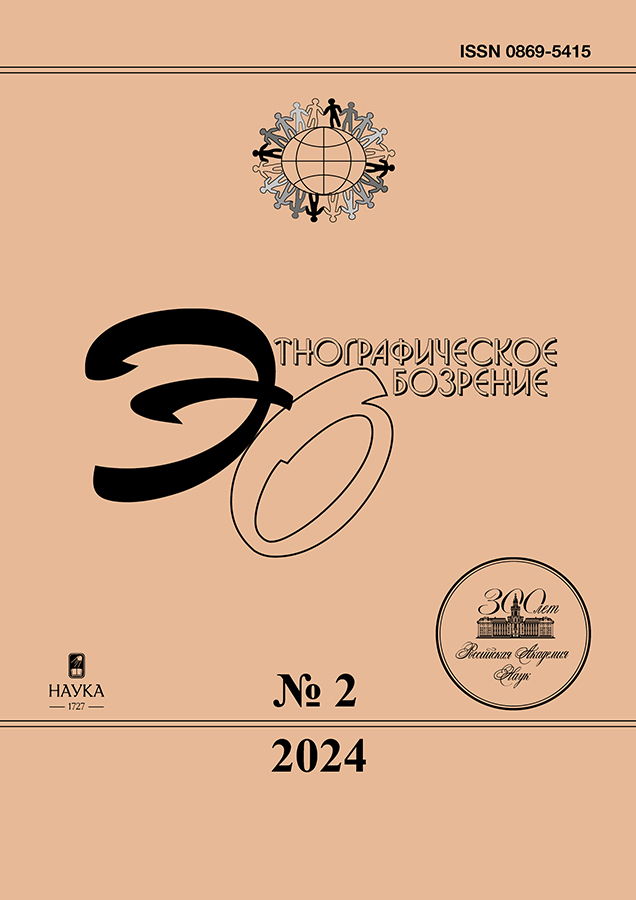Reciprocity and patron-clientelism as forms of an institution of mutual assistance network in villages of the Republic of Tatarstan
- 作者: Sagdieva E.А.1
-
隶属关系:
- Marjani Institute of History of Tatarstan Academy of Sciences
- 期: 编号 2 (2024)
- 页面: 229-246
- 栏目: Research Articles
- URL: https://permmedjournal.ru/0869-5415/article/view/672570
- DOI: https://doi.org/10.31857/S0869541524020129
- EDN: https://elibrary.ru/CJVTKZ
- ID: 672570
如何引用文章
详细
The sustainability of the rural world of the Republic of Tatarstan today largely depends on the development and functioning of the institution of network mutual assistance. I attempt to study the situation, making use of network theories in sociology as well as concepts of reciprocal and patron-client relationships as key aspects in the reproduction of mutual assistance networks. Drawing on field interviews collected in various villages of Tatarstan, I examine the actors and practices of mutual assistance in reciprocal and patron-client rural relationships and argue for the necessity of further support and development of mutual assistance networks in rural areas as a way of securing collective mutual insurance in an unstable economic situation.
全文:
作者简介
Elvina Sagdieva
Marjani Institute of History of Tatarstan Academy of Sciences
编辑信件的主要联系方式.
Email: elvina_n@inbox.ru
к. соц. н., старший научный сотрудник отдела этнологических исследований
俄罗斯联邦, 7А Baturina St., Kazan, 420111参考
- Barsukova, S.Y. 2004. Neformal’naiia ekonomika [Informal Economy]. Moscow: GU VShE.
- Burt, R. 1992. Structural Holes: The Social Structure of Competition. Cambridge, Mass: Harvard University Press.
- Dementiev, V.E., S.G. Evsiukov, and E.V. Ustiuzhanina. 2019. Otnosheniia retsiproknosti na formiruiushchihsia rynkah setevyh blag [Reciprocity Relations in Emerging Markets of Network Goods]. Terra Economicus 17 (4): 23–40. https://doi.org/10.23683/2073-6606-2019-17-4-23-40
- Fadeeva, O. 1999. Mezhsemeinaia set’: mekhanizmy vzaimopodderzhki v rossiiskom sele [The Inter-Family Network: Mutual Support Mechanisms in the Russian Countryside]. In Neformal’naia ekonomika. Rossiia i mir [The Informal Economy: Russia and the World], edited by T. Shanin, 183–218. Moscow: Logos.
- Fodoria, A.Y. 2005. Sotsial’nyi institut vzaimopomoshchi i ego evoliutsiia v protsesse modernizatsii model’nykh etnosov [The Social Institute of Mutual Assistance and Its Evolution in thePprocess of Modernization of Model Ethnic Groups]. Moscow: Moskovskii gosudarstvennyi universitet servisa.
- Fodoria, A.Y. 2016. Sotsial’naya solidarnost’ kak konceptual’naia osnova izucheniia instituta vzaimopomoshchi v zarubezhnoi sotsiologii i sotscial’noi antropologii XIX–XX vekov [Social Solidarity as a Conceptual Basis for Studying the Institute of Mutual Assistance in Foreign Sociology and Social Anthropology of the 19–20 Centuries]. In Osobennosti sotsial’noi solidarnosti v sovremennom rossiiskom obshchestve: materialy mezhvuzovskoi nauchno-prakticheskoi konferentsii [Features of Social Solidarity in Modern Russian Society: Materials of the Interuniversity Scientific and Practical Conference, Moscow, March 25–26], edited by A.V. Tkachenko, 156–167. Moscow: Pero.
- Fomashin, V.S. 2020. Daroobmen kak osnova sotsial’nogo vzaimodeistviia [Gift Exchange as the Basis of Social Interaction]. Gumanitarnyi vestnik 3 (83). http://dx.doi.org/10.18698/2306-8477-2020-3-667
- Gabdrakhmanova, G.F. 2016. Ob osobennostiakh etnicheskoi identichnosti tatar [About the Peculiarities of the Ethnic Identity of the Tatars]. Istoricheskaia etnologiia 1 (1): 27–38.
- Gabdrakhmanova, G.F. 2021. Smysly i praktiki povsednevnogo trudovogo povedeniia sel’skikh russkikh i tatar [Meanings and Practices of Everyday Labor Behavior of Rural Russians and Tatars]. EKO 2 (51): 85–103. https://doi.org/10.30680/ESO0131-7652-2021-2-85-103
- Gradoselskaia, G.V. 2004. Setevye izmereniia v sotsiologii: uchebnoe posobie [Network Measurements in Sociology: A Textbook], edited by G.S. Batygina. Moscow: Novyi uchebnik.
- Granovetter, M. 2009. Sila slabykh sviazei [The Strength of Weak Ties]. Ekonomicheskaia sotsiologiia 10 (4): 31–50.
- Kovalev, E.M., ed. 1996. Golosa krest’ian: sel’skaia Rossiia XX veka v krest’ianskikh memuarakh [Peasant Voices: Rural Russia of the 20 Century in Peasant Memoirs]. Moscow: Aspekt Press.
- Maltseva, D.V. 2018. Setevoi podhod kak fenomen sotsiologicheskoi teorii [Network Approach as a Phenomenon of Sociological Theory]. Sociologicheskie issledovaniia 4: 3–14. https://doi.org/10.7868/S0132162518040013
- Polanyi, K. 2002. Ekonomika kak institutsional’no oformlennyi protsess [Economics as an Institutionalized Process]. Ekonomicheskaia sotsiologiia 3 (2): 62–73.
- Reutov, E.V., M.N. Reutova, and I.V. Shavyrina. 2019. Retsiproknost’ v setiah vzaimopomoshchi (na materialah regional’nogo issledovaniia) [Reciprocity in Mutual Aid Networks (Based on the Materials of a Regional Study)]. Sotsiologicheskie issledovaniia 3: 106–117. https://doi.org/10.31857/S013216250004283-4
- Sahlins, M. 1999. Ekonomika kamennogo veka [The Economics of the Stone Age]. Moscow: OGI.
- Shanin, T. 1999. Ekspoliarnye struktury i neformal’naia ekonomika sovremennoi Rossii [Expolar Structures and the Informal Economy of Modern Russia]. In Neformal’naia ekonomika. Rossiia i mir [The Informal Economy: Russia and the World], edited by T. Shanin, 11–32. Moscow: Logos.
- Shanin, T. 2002. Obychnoe pravo v krest’ianskom soobshchestve [Customary Law in the Peasant Community]. In Kuda idet Rossiia? Formal’nye instituty i real’nye praktiki [Where is Russia Going? Formal Institutions and Real-World Practices], edited by T.I. Zaslavskaya, 267–274. Moscow: Moskovskaia shkola sotsial’nykh i ekonomicheskikh nauk.
- Sharin, V.I. 2021. Osnovy semeinoi vzaimopomoshchi (na primere semei s det’mi – studentami universiteta) [Fundamentals of Family Mutual Assistance (On the Example of Families with University Student Children)]. Vestnik Yuzhno-Ural’skogo gosudarstvennogo universiteta. Seriia, Sotsial’no-gumanitarnye nauki 21 (3): 87–94. https://doi.org/10.14529/ssh210311
- Shevchenko, I.O. 2013. Sotsial’nye seti i praktiki vzaimopomoshchi v sem’iakh s malen’kimi det’mi [Social Networks and Mutual Assistance Practices in Families with Young Children]. Vestnik RGGU. Seriia, Sotsiologicheskie nauki 2 (103): 103–104.
- Shteinberg, I. 1999. Russkoe chudo: lokal’nye i semeinye seti vzaimopodderzhki i ikh transformatsiia [Russian Miracle: Local and Family Mutual Support Networks and Their Transformation]. In Neformal’naia ekonomika. Rossiia i mir [The Informal Economy: Russia and the World], edited by T. Shanin, 207–239. Moscow: Logos.
- Turner, J.H. 1991. The Structure of Sociological Theory. Belmont: Wadsworth Thomson Learning.
- Vlasova, N.V. 2016. Praktiki reprezentatsii etnichnosti v polietnicheskom regione (na materialah Srednego Povolzh’ia) [The Practice of Representation of Ethnicity in a Multiethnic Region (Based on the Materials of the Middle Volga Region)]. Karel’skii nauchnyi zhurnal 5 (4/17): 220–225.
- Zotova, M.V. 2016. Volonterskaia deiatel’nost’ studentov kak sovremennaia forma blagotvoritel’nosti [Student Volunteer Activity as a Modern Form of Charity]. Tsentr innovatsionnykh tekhnologii i sotsial’noi ekspertizy 3 (7). http://ma123.su/load/citiseh_3_7_2016g/13_00_00_pedagogicheskie_nauki/zotova_m_v_volonterskaja_dejatelnost_studentov_kak_sovremennaja_forma_blagotvoritelnosti/44-1-0-274
补充文件









